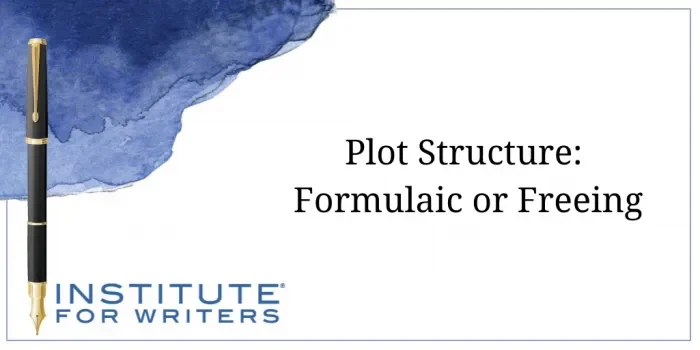1000 N. West Street #1200, Wilmington, DE 19801
© 2024 Direct Learning Systems, Inc. All rights reserved.

Books on plotting abound. They are often put together by experienced writing professionals with proven track records. The various descriptions of the contents between the attractively packaged covers might sound like a cure for whatever is ailing your current manuscript.

Am I cynical? Yes. But I also firmly believe that you have to know the rules about structure before you can make informed choices on whether to break them. That’s one of the reasons that I always go back to some of my favorite old books on novel-writing and storytelling before starting a new project. I’ll also read new ones that my writing friends have suggested. Some texts make general recommendations; others insist on a very specific placement of the plot points as a percentage of the manuscript pages.
I often share the following outline with my students as a starting point. The brief descriptions contain bits of jargon that I’ve picked up and mixed together from various sources.
Set-up: A view of the protagonist’s ordinary world that hooks the reader.
Turning point: The story takes on a new direction as the challenge is revealed.
Problem Intensifies
Temporary Triumph
Reversal: There may be any number of temporary triumphs and reversals until…
Darkest Moment: All is Lost.
Decision Time: The protagonist regroups after surviving the devastation.
Final Obstacle
Climax
Resolution
The pantser/plotter divide is a well-known split among writers. The plotters will fill in their beat sheets, create chapter summaries, and draft character sketches. The pantsers might have the barest idea of the situation that an interesting character might be in before they start typing the opening sentence of their first chapter. If they knew exactly how the story was going to turn out, why would they waste their time writing it? As author E.L. Doctorow once noted, “Writing a novel is like driving a car at night. You can see only as far as your headlights, but you can make the whole trip that way.”

Then again, some plotters might appear to be plodders. While they might know where they’re going, they are going to take whatever time they need in order to get there because they can’t bear to leave a less-than-perfect sentence in the rearview mirror. But no matter whether plotters draft their projects slowly or quickly, they should leave themselves open to stopping for a spectacular sunrise or turning around when a bridge is out.
Pantsers may not know exactly how they’re going to get somewhere in their story, but they will frequently have a goal even if it’s a distant and fuzzy one. They’re going to explore and find connections and create something that feels completely organic. They’re sure that everything will sharpen up once they get a little closer. Others won’t have any idea where they’re going at all. In fact, they might not have the faintest clue of what their characters are going to do next until they actually sit down in front of their computers and start typing.
When pantsers get to the end of a draft, it’s often their turn to be analytical. The things that they’ve learned about their world and their characters by the end of the novel have to be incorporated in the beginning. They look at what they have and think about how to use some classic elements of structure in order to strengthen the pacing.
And maybe, just maybe, the pantser and the plotter should experiment with each other’s methods…at least for a little while. They might learn something about their characters and about themselves.
Kristin Wolden Nitz has had sixteen different addresses in eight different states since graduating from college. When she tells friends and family that she’s not moving again, they laugh. Kristin splits her time between writing novels and serving as one of our instructors. Kirkus described her novel Suspect as “intriguing, suspenseful fun.”
1000 N. West Street #1200, Wilmington, DE 19801
© 2024 Direct Learning Systems, Inc. All rights reserved.
1000 N. West Street #1200, Wilmington, DE 19801
© 2024 Direct Learning Systems, Inc. All rights reserved.
1000 N. West Street #1200, Wilmington, DE 19801
© 2024 Direct Learning Systems, Inc. All rights reserved.
1000 N. West Street #1200, Wilmington, DE 19801
© 2025 Direct Learning Systems, Inc. All rights reserved.
1000 N. West Street #1200, Wilmington, DE 19801
©2025 Direct Learning Systems, Inc. All rights reserved. Privacy Policy.
3 Comments